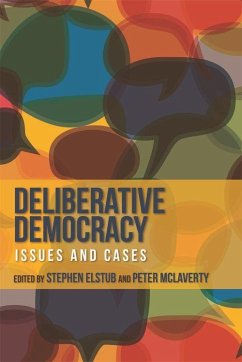Deliberative democracy is the darling of democratic theory and political theory more generally, and generates international interest. In this book, a number of leading democratic theorists address the key issues that surround the theory and practice of deliberative democracy. They outline the problems faced by deliberative democracy in the context of the available empirical evidence, survey potential solutions and put forward new and innovative ideas to resolve these issues. Each chapter takes a key issue as its focus, looking at issues such as conflict, inequality, pluralism, participation and the public sphere.
'Deliberative democracy goes from strength to strength in the theory, practice, and analysis of politics. One sign of its success is the number of controversies that surround it. Deliberative Democracy: Issues and Cases is an excellent and essential guide to key contemporary controversies in the field engaged by some of its best scholars.' John Dryzek, Australian National University Addresses key problems in deliberative democracy through a range of relevant empirical evidence and case studies Liberal democracy around the world is in crisis and deliberative democracy is increasingly seen as the solution. Yet despite its meteoric growth in popularity, there are gaps in the case for deliberative democracy that plague its study - hindering its further development and its approximation in practice - that still need to be addressed and resolved. Empirical evidence on deliberative democracy is enabling new perspectives on these key issues to emerge, allowing the theory of deliberative democracy to be reconsidered. In this book leading democratic theorists and empiricists, who have written widely about deliberative democracy, address 10 of these crucial issues. They outline the problems, survey the solutions suggested to them, and provide new and innovative ideas to resolve the issues - thereby making a profound contribution to the development of deliberative democracy in theory and practice and to the ongoing, and increasingly urgent, debates about the meaning, desirability and practicality of deliberative democracy. Key Features . Introduction provides a brief historical overview of deliberative democracy . Includes chapters on each of the 10 key problems associated with deliberative democracy: conflict, inequality, expertise, public policy, pluralism, citizen competence, 'scaling up', public openness, inclusion and mini-publics . Reflects on the future of deliberative democracy and the remaining challenges for developing a deliberative system . Combines new and distinctive theoretical insights with up-to-date empirical evidence on vital issues in deliberative democracy Stephen Elstub is a Senior Lecturer in Politics at the University of the West of Scotland. He is the author of Towards a Deliberative and Associational Democracy (Edinburgh University Press, 2008) and editor of Democracy in Theory and Practice (2012). Peter McLaverty is a Reader in Public Policy at the Robert Gordon University. He was editor of the book Public Participation and Innovations in Community Governance (2002). Cover image: © Brandon Laufenberg/iStockphoto Cover design: [EUP logo] www.euppublishing.com
Hinweis: Dieser Artikel kann nur an eine deutsche Lieferadresse ausgeliefert werden.
'Deliberative democracy goes from strength to strength in the theory, practice, and analysis of politics. One sign of its success is the number of controversies that surround it. Deliberative Democracy: Issues and Cases is an excellent and essential guide to key contemporary controversies in the field engaged by some of its best scholars.' John Dryzek, Australian National University Addresses key problems in deliberative democracy through a range of relevant empirical evidence and case studies Liberal democracy around the world is in crisis and deliberative democracy is increasingly seen as the solution. Yet despite its meteoric growth in popularity, there are gaps in the case for deliberative democracy that plague its study - hindering its further development and its approximation in practice - that still need to be addressed and resolved. Empirical evidence on deliberative democracy is enabling new perspectives on these key issues to emerge, allowing the theory of deliberative democracy to be reconsidered. In this book leading democratic theorists and empiricists, who have written widely about deliberative democracy, address 10 of these crucial issues. They outline the problems, survey the solutions suggested to them, and provide new and innovative ideas to resolve the issues - thereby making a profound contribution to the development of deliberative democracy in theory and practice and to the ongoing, and increasingly urgent, debates about the meaning, desirability and practicality of deliberative democracy. Key Features . Introduction provides a brief historical overview of deliberative democracy . Includes chapters on each of the 10 key problems associated with deliberative democracy: conflict, inequality, expertise, public policy, pluralism, citizen competence, 'scaling up', public openness, inclusion and mini-publics . Reflects on the future of deliberative democracy and the remaining challenges for developing a deliberative system . Combines new and distinctive theoretical insights with up-to-date empirical evidence on vital issues in deliberative democracy Stephen Elstub is a Senior Lecturer in Politics at the University of the West of Scotland. He is the author of Towards a Deliberative and Associational Democracy (Edinburgh University Press, 2008) and editor of Democracy in Theory and Practice (2012). Peter McLaverty is a Reader in Public Policy at the Robert Gordon University. He was editor of the book Public Participation and Innovations in Community Governance (2002). Cover image: © Brandon Laufenberg/iStockphoto Cover design: [EUP logo] www.euppublishing.com
Hinweis: Dieser Artikel kann nur an eine deutsche Lieferadresse ausgeliefert werden.

